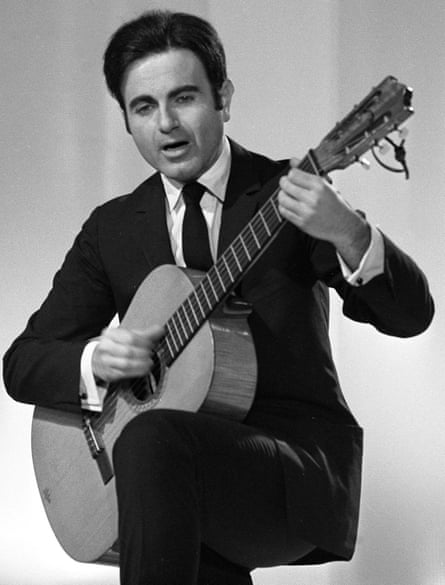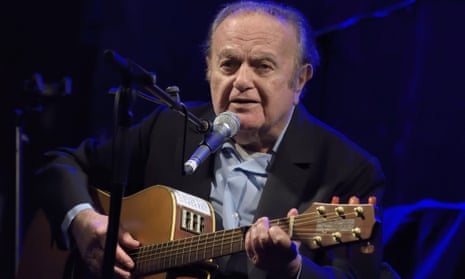To generations of French people who grew up with his songs, Guy Béart, who has died aged 85, was, as Le Figaro described him, the last troubadour. His name became synonymous with the art of “French chanson”, but despite more than 200 songs and 23 albums he never gained the recognition many felt he deserved.
Overshadowed by his predecessors Jacques Brel and Georges Brassens, publicly insulted and ridiculed by his more outrageous contemporary Serge Gainsbourg, Béart had no sooner become famous in France in the late 1950s than his light was eclipsed by the arrival from across the Atlantic of rock’n’roll.
“In 1957, I was a star, but in 1963 at the time the ‘twist’ conquered the century, I was a has-been,” Béart told Le Monde in 2003. “At 33, I had only my reputation. Unlike Brel and Brassens, I didn’t set out to be a singer and as success was immediate, I didn’t experience the lean times, I was never obliged to build a network or a clan and I never had to play a character.”
And so, in a career that saw regular, but relatively short-lived flashes of fame, he became a television celebrity, hosting a chatshow whose guests included Brassens and Duke Ellington, and kept writing songs.
Any bitterness this deeply shy man felt at the record company and media executives who underrated him were channelled into his lyrics. “I have a great respect for the song, which to me is the purest expression of the human spirit,” Béart said in 2009.
While starting out as a singer, his painful reticence made public performances a trial, but even in private he was a loner. “I’ve given thousands of concerts, signed mountains of autographs, produced television programmes and known the society world. That said, I am a profoundly solitary person. My goal is to become the 20th century’s unknown,” he told Le Nouvel Observateur.
To his daughter, the actor Emmanuelle Béart, he was “a man without lies, without a mask, without makeup … an iconoclast and anarchist, pure and simple.”
Béart was born Guy Béhart-Hasson, in Cairo, the son of an accountant and business consultant whose work took the Jewish family to Greece, Italy, the US, France, Mexico and Lebanon. At 17, Guy left Beirut for Paris to study at the prestigious Lycée Henri‑IV and later the Ecole Nationale de Musique.
His love of music – he studied the violin and the guitar – was matched by his passion for mathematics, and he also obtained a degree in engineering from the Ecole Nationale des Ponts et Chaussées. While taking a variety of jobs, including as a mathematics teacher, to support his family after the death of his father, he did the rounds as a singer in Parisian cabaret clubs and wrote songs for Juliette Gréco, Yves Montand, Maurice Chevalier and others.
He recorded his first album in 1957, and the following year the Academy of French Records awarded him its Grand Prix. But his biggest success came with title soundtrack of François Villiers’ film L’Eau Vive (Girl and the River, 1958), a song regarded as a classic example of French chanson.
This homegrown musical genre, as personified by Edith Piaf, Charles Aznavour and Charles Trenet, took a blow with the advent of Anglo-American rock and pop, which became known as chanson yéyé and turned Johnny Hallyday into a national icon. One of Hallyday’s early records was a version of Let’s Twist Again, by Chubby Checker; the celebrated “twist” that Béart lamented nudged him, with his poetic, often melancholic songs, into the shade.

Béart, however, remained true to the music he saw as a high art form. This led to a clash with Gainsbourg in 1986 on a popular television show where Gainsbourg insisted songwriting was a “minor art”. When Béart challenged this view, the infamously outspoken Gainsbourg lewdly called him a connard.
Shunned by the major record companies, Béart created his own label and then became a television show host with Bienvenue, which ran from 1966 until 1972. In 1977, with Pierre Cour he composed the Luxembourg entry for the Eurovision song contest, but he disappeared in the 1980s when he was reportedly treated for cancer.
He resurfaced in the 1990s, but his stage appearances became increasingly rare. His last album, Le Meilleur des Choses (The Best of Things), was released in 2010. Earlier this year he gave a four-hour farewell concert at a packed Paris Olympia.
On hearing of Béart’s death from a heart attack near his home in the eastern suburbs of Paris, president François Hollande paid tribute to a “writer, composer, incomparable singer whose refrains are on the lips of all generations of French people”.
Béart’s marriages to Cécile de Bonnefoy du Charmel and to the Belgian-born model and actor Geneviève Galéa were dissolved. He is survived by his daughter from his first marriage, Eve, a jewellery designer, by Emmanuelle, from his second marriage, and by three sons.

Comments (…)
Sign in or create your Guardian account to join the discussion